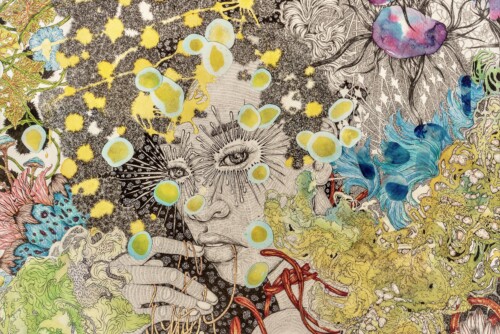i. the scent of jostled grief
after and before carnival. causing carnival, there was a craving. a salt craving for a particular smell. no one talked about it. or explicitly associated the sweetness of saltfish with the memory of being packaged and preserved (barely) while crossing over. it was a memory too visceral for verbs. but it was there. and some people waited all year for it like a release and an excuse to fully sweat. some people had to fly home for it. some people tried to reproduce it (and failed) in the cities of their escape. they had to have it. and if they didn’t get it one way, they would find themselves still seeking it in blood or a fascination with the body fluids of the exact wrong people. (in bed with them wondering why. in fights with them wondering why. in basements seeking a sacrifice to quiet the craving.)
there aren’t any words for it. no one can put it on their tongue to say i need the memory of being brined meat for monsters to snack on. i need a closeness made from the opposite of love. i need the anonymity of abject arrival. give me the scent of jostled grief. no one would say that. no one ever said that. but they did sometimes pack themselves into rooms with unknown fire codes and stay and sweat until they forgot everything else. they did press up against walls and corners with a secret hope of splintering. they did take to the streets for carnival dehydrated and sweating, proving an endurance no one had any use for. they did fill the whole island with the creviced sweat of knowing, evaporating into the odor, the taste of their survival.
ii. the basements of immigrant homes
their basements were not so much about keeping. i mean, look, the cluttered mantles and end tables. look the bright family pictures layered on top the older family pictures mailed year after year all in the same frame. look how the whole place become an altar to looking well. pose and posture and figurines and cookie tins and evidence of other empires to leverage out the one we living in. it smells like we cooking a particular form of magic. and not everyone can cross this threshold. see where we place the mirror so you can see yourself out if you come with malice. no one saying obeah, but no one saying feng shui either. we have much, but we don’t have much to put away. and really we used to living at sea level properly. or in rented rooms temporarily. or if is what they call “extra space,” soon enough some cousin in there sleeping.
so basement is not a thing we really study like how you study it. or say basement is not a place where we put things we want to keep and ignore. but in some houses, and you only know if you should know, deep in the house is a place of blood and transformation, shells and seeds and knowing. a place of remembering and washing. a place of guidance and entrancement. and only the brave would dream to sleep there. but who know more duppy than we. they out duppy duppy in the basement, deep in the backyard, in the off-display places at home. living room is like the jewelry. layered and loud with performance. what you call the basement, we would call the heart. where blood run thick.
iii. did she experience it, that is, witness it, or was she told about it as a common practice?
she was always watching. even when she only knew a word or two, they could tell. she would mimic the movements, the praise songs, tone out the oriki in baby talk. so she knew. later, when none of those basements existed any more and the people that had known were scattered back into sand, she kept what she knew lower than consciousness, somewhere in the muscle memory, triggered at odd times by cologne or cornstarch or the right set of sounds in the right order.
the gods becoming human. she had seen it before. so she knew it was possible, even if she didn’t know she remembered. even if she didn’t remember knowing. you know what i mean. so later, they thought that might have been part of the reason.
- The titles of these vignettes come from “Pedagogies of the Sacred: Making the Invisible Tangible,” in Pedagogies of Crossing: Meditations on Feminism, Sexual Politics, Memory, and the Sacred by M. Jacqui Alexander. These vignettes are excerpts from my 2018 book M Archive: After the End of the World .[↑]



